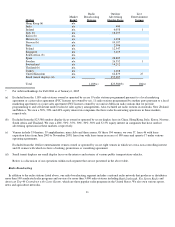iHeartMedia 2004 Annual Report Download - page 21
Download and view the complete annual report
Please find page 21 of the 2004 iHeartMedia annual report below. You can navigate through the pages in the report by either clicking on the pages listed below, or by using the keyword search tool below to find specific information within the annual report.
Our Business is Dependent Upon the Performance of Key Employees, On-Air Talent and Program Hosts
Our business is dependent upon the performance of certain key employees. We employ or independently contract with several on-air
personalities and hosts of syndicated radio programs with significant loyal audiences in their respective markets. Although we have entered
into long-term agreements with some of our executive officers, key on-air talent and program hosts to protect our interests in those
relationships, we can give no assurance that all or any of these key employees will remain with us or will retain their audiences. Competition
for these individuals is intense and many of our key employees are at-will employees who are under no legal obligation to remain with us. Our
competitors may choose to extend offers to any of these individuals on terms, which we may be unwilling to meet. In addition, any or all of our
key employees may decide to leave for a variety of personal or other reasons beyond our control. Furthermore, the popularity and audience
loyalty of our key on-air talent and program hosts is highly sensitive to rapidly changing public tastes. A loss of such popularity or audience
loyalty is beyond our control and could limit our ability to generate revenues.
Doing Business in Foreign Countries Creates Certain Risks Not Found in Doing Business in the United States
Doing business in foreign countries carries with it certain risks that are not found in doing business in the United States. We currently derive
a portion of our revenues from international radio broadcasting, outdoor advertising and live entertainment operations in countries around the
world and a key element of our business strategy is to expand our international operations. The risks of doing business in foreign countries that
could result in losses against which we are not insured include:
Exchange Rates May Cause Future Losses in Our International Operations
Because we own assets overseas and derive revenues from our international operations, we may incur currency translation losses due to
changes in the values of foreign currencies and in the value of the U.S. dollar. We cannot predict the effect of exchange rate fluctuations upon
future operating results.
Extensive Government Regulation May Limit Our Broadcasting Operations
The federal government extensively regulates the domestic broadcasting industry, and any changes in the current regulatory scheme could
significantly affect us. Our broadcasting businesses depend upon maintaining broadcasting licenses issued by the FCC for maximum terms of
eight years. Renewals of broadcasting licenses can be attained only through the FCC’s grant of appropriate applications. Although the FCC
rarely denies a renewal application, the FCC could deny future renewal applications resulting in the loss of one or more of our broadcasting
licenses.
• exposure to local economic conditions;
• potential adverse changes in the diplomatic relations of foreign countries with the United States;
• hostility from local populations;
• the adverse effect of currency exchange controls;
• restrictions on the withdrawal of foreign investment and earnings;
• government policies against businesses owned by foreigners;
• investment restrictions or requirements;
• expropriations of property;
• the potential instability of foreign governments;
• the risk of insurrections;
• risks of renegotiation or modification of existing agreements with governmental authorities;
• foreign exchange restrictions;
• withholding and other taxes on remittances and other payments by subsidiaries; and
• changes in taxation structure.
























